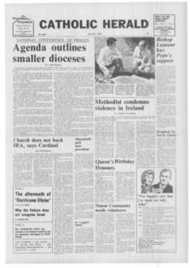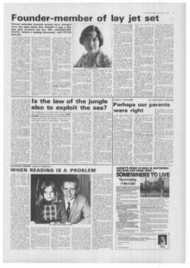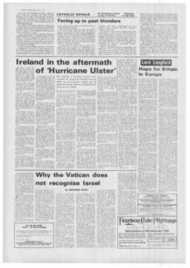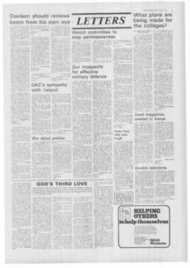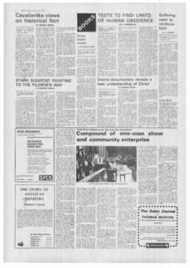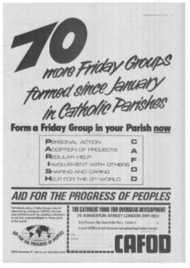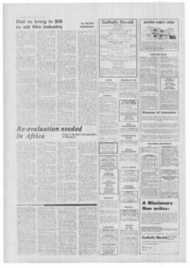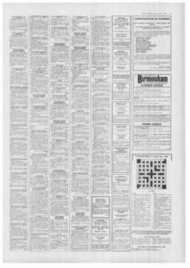Page 8, 21st June 1974
Page 8
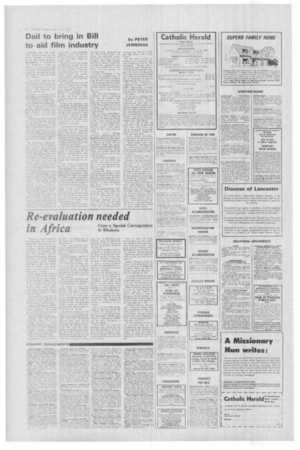
Report an error
Noticed an error on this page?If you've noticed an error in this article please click here to report it.
Tags
Share
Related articles
Cork Award Likely For 'catholics'
Back From The Ivth Catholic International Film Congress...
Woman Director Rings The Bell
T.v., Films By Freda Bruce Lockhart
The Pope To ! Intensify Peace Efforts
Dail to bring in Bill to aid film industry
by PETER JENNINGS
Opening the 19th Cork Film International at the Savoy Cinema in Patrick Street. Mr Justin Keating, 1.4.-114-4lcr for Commerce and Industry., mold an audience of more than 2,000 that a new Film Industry Bill would be introduced in the Dail soon to help the Irish film industry.
The official opening was preceded by a reception at the Nietropole Hotel at which we all were welcomed to Cork by Senator Pat Kerrigan. the Mayor, and his wile.
It was a concentrated programme. with nearly 90 films from more than 25 countries.
There were entries from China, Soviet Russia, Bulgaria, Ceechoslovakia, Saudi Arabia, India, Nigeria and New Zealand. Sixteen entries were from Britain, 12 from the Ifnited States and six from
Unfortunately the standard of one or two of the films selected by the committee for showing was slightly questionable, In his report on the feature films, Mr John. Boorman, the jury president, said: "Many features were inferior, indeed some were SO hadehat one was baffled as to how they got into the festival at all," ,Mr Boornian continued: "Cork's rule is thin the features must not have been shown at other festivals. Perhaps this rule should be changed. Why not in vite the best pictures that have appeared in other festivals so that Irish film enthusiasts can be sure that once a year they will see the cream of international cinema in the wonderfully relaxed and efficiently organised ambience. of Cork?'
At the end of my first visit to the Cork International I can certainty echo John Doorman's Izolt re marW. R was without doillst a most relaxed, warm, friend's and informal film festive'. It eras refreshingly different. Here there were real human beings and not pseudostars, out on :a publicity trip. The Savoy Cinema, where the main evening showings took place, is 42 years old and is the largest cinema in Ireland, It has housed .the festival since its inception, hut this is possibly its last year as it is due to be con
verted into U more profitable shoPping centre. The festival will then have to be transferred to the Cork Opera House on Levitt's Quay.
The green, white and orange Irish flag flew proudly from the top of the Savoy all week, and the flags of many of the participating nations flew from the balcony outside the cinema, which looked picturesque at night, lit by an array of red, blue itial white lights.
. The festival had more than 60 sponsors, ranging from national companies to local shops. The main financial backers were Boitrii Failtethe Irish Tourist Beard which gave .about £ I I ,000. and Player & Wills (Ireland), which put up about £.6,000.
A justifiably aggressive and annoyed. Mr Dermot Breen, 49years-old director of the festival since it began in 1955, said al his closing press conference that the festival had not received good press coverage, and that Irish television and radio were conspicuous by their almost total lack of coverage, "Cork festival is an important national and not a local parochial event," said Mr Breen. "We are concerned only with the art of the cinema, and next week we are going to plan our 20th birthday celebrations. irrespective of where. the money is going to come from."
One of the new features of the festival this year was a special course in film techniques for fifth-year schoolchildren from all over the Republic at the Pavilion Cinema, run by the British Film Institute in London.
About 150 boys and girlseook part in the course, which was oversubscribed in a matter ot days. Well-known professional
film-makers explained, with clippings, the different aspects of iilmmaking and techniques.
[he teenagers appreciation of filiTIS was greatly enhanced during the week. A typical comment earne from 16-years-old Margot Carlile of the Sacred Heart School, Cork: "It was great fun and I enjoyed learning how special effects were done and how stunt-men were substituted for real actors. I like James Bond films best."
The children had to pay only e registration tee, as the course
was generously sponsored by Mr David Hemmings. Mr Breen. the Irish film censor, described the course as an experiment which had worked, and said he hoped it would be considerably expanded next year with possibly two or even three courses going on simultaneously. Another highlighe of the festival was a performance of the Mass of St Finbarr, composed by Bernard Geary, a talented Cork composer who was invited to write the Mass for last year's festival in honour of St Flamm who is said to have founded Cork City.
The Cork Film International
Children's Choir, comprising more than 80 children from Cork schools, gave an impressively moving performance of the Mass conducted by the composer, in the lovely Franciscan Church of St Francis in Liberty Street.
The principal concelebrant, Fr Florence, OFM, welcoming visitors to the Mass, said that as it was Trinity Sunday he had three words for the packed congregation of over 2,000, cornprising people from every aspect of the communications media.
These were Fa ilte (Welcome), Firinne (Truth) and Bannacht (Blessing). He added: "What will enrich the Kingdom of Heaven on Earth will not necessarily bring the money rolling into the box oflice. In the great communications media, actors and writers bring the word. Let us hope that it is the word of truth."
At the Elevation a fanfare was sounded anti the Irish flag lowered. This Muss of Si Finbarr is now available on a longplaying record, and it is well worth hearing. Outside the Savoy Cinema many people gathered to catch a glimpse of the famous going in and out each evening. Of all the personalities in Cork last week, probably the most entertaining was Jesse Lasky, Jr, from lIollywood. A distinguished-looking man, Jessie Lasky, whose father had produced the first film ever made in Hollywood in 1913, began his career with Paramount Pictures. lie has over the years written many famous film scripts, including 'The Ten Commandmeni s' "Samson and Delilah" "Hell and High Water" and "Lorna Doone' .
He has also worked on television, in connection with such well-known series as "The Avengers" "Danger Man" "The Saint" and "The Baron". On Saturday morning Mr Lasky gave the most amusing press conference of the week, Telling story after story. about the early days in Hollywood, he held us spellbound for over an hour.
His book "Whatever Happened to Hollywood?" is a highly entertaining, nostalgic look at Hollywood, and not surprisingly it has already' become a best seller.
Al his press conference the distinguished French director, Francois Truffaut, whose Oscar-winning film "Day For Night" was shown during the festival together with his other films in a tribute programme to him, said through an interpreter that it was getting increasingly diffictili to get good films distributed today because of all the pornographic films about.
Ile also told us that he preferred to work in black and white rather then colour, but said it was getting increasingly difficult to find a market for Another festival personality was the lovely American actress Caroll Baker, star of such filins as "Baby Doll" and "The Carpetbaggers". Unfortunately she could grace us with her charm only for a few days as she was flying off to Italy to make a new picture. Trevor Howard, star of "Ryan's Daughter" and "Catholics" was-also with us for only a few days. Unfortunately "Catholics". the outstanding film of the week for me, did not receive an award. After its showing on Friday afternoon a few of us were whisked off to the RTE studios on Union Quay to record an hour-long radio show about the Festival.
Also in Cork for the festival were John Boorman, whose latest film is "%a rdos"t James Mitchell, the prolific and successful writer of' "Callan": and Norman Cohen, whose films include "Till Death Us Do Part", "Dad's Army". and his latest, "The Importance of Being Dublin" a sad and personal view of his home town, which
was shown at the festival, \
black and white films.
blog comments powered by Disqus


